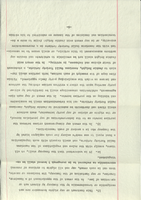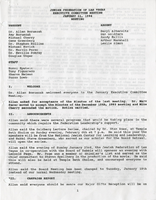Search the Special Collections and Archives Portal
Search Results
Las Vegas Archive Memorabilia and Promotional Materials
Identifier
Abstract
The Las Vegas Archive Memorabilia and Promotional Materials (approximately 1960-2019) contains reproductions of photographs taken of historic landmarks around Las Vegas, Nevada and entertainers like Elvis Presley, Nat King Cole, Frank Sinatra, Dean Martin, and Liberace performing in Las Vegas. The collection also contains digital photographs from 2008 of an airship displaying an advertisement for the M Resort Spa and Casino. There is also memorabilia from the MGM Grand Hotel including a gaming guide, decks of playing cards, and a commemorative drinking glass. The collection also includes several historic postcards depicting Las Vegas, political campaign buttons for local Nevada elections, and greeting cards from U.S. Representative Jim Santini.
Archival Collection
Joseph "Wingy" Manone Papers
Identifier
Abstract
The Joseph "Wingy" Manone Papers (1934-1996) include a partial draft of his autobiography, newspaper clippings, correspondence, magazine articles, and press releases related to his musical career. Manone also wrote music, some of which is included in the collection.
Archival Collection
Lee Plotkin Papers
Identifier
Abstract
The Lee Plotkin papers document Plotkin's political work and associations as an LGBT activist and spokesman for the Las Vegas gay community, and include correspondence, press releases, copies of his columns, institutional and legislative documents, brochures, fliers and other ephemera from 1955 to 2006.
Archival Collection
International Association of Gaming Attorneys Collection
Identifier
Abstract
The International Association of Gaming Attorneys (IAGA) collection is comprised of materials collected from various corporations and casinos in Nevada and New Jersey, ranging from 1977 to 1986. There are a wide array of documents including: gaming license applications from corporations in Nevada and New Jersey, copies of casino control acts from New Jersey, gaming publications, gaming-conference proceedings, gaming commission reports, newsletters and correspondence of the National Association of Gaming Attorneys (NAGA).
Archival Collection
John Ponticello Papers
Identifier
Abstract
The John Ponticello Papers are comprised of materials related to Ponticello's experiences in Las Vegas, Nevada between 1956 and 1971 with an emphasis on his Research Gambling Game Project, which he conducted and published between 1968 and 1971. The collection includes materials regarding gaming licenses and applications, research agreements, descriptions of the project, and publications about the research project. Also included are materials from Ponticello's experiences in Las Vegas such as business cards, county work cards, and souvenir photographs.
Archival Collection

Transcript of interview with Sandra Peña by Lada Mead and Stefani Evans, March 27, 2017
Date
Archival Collection
Description
Sandra Peña’s story begins in East Los Angeles, where she spent her first fifteen years with her parents (both from Michoacán, Mexico), and her younger sister. The father's managerial position at Master Products allowed the family to live rent-free in a company-owned house behind the main factory, because he collected the rents for the company's two other dwellings. In this interview, Peña recalls the family move to Porterville, in California's Central Valley, her return to Los Angeles at nineteen, and her work with Parson’s Dillingham, a contractor for the Metrolink rail system. She draws the link between the Los Angeles and Las Vegas construction communities by describing her husband's move to Las Vegas to find work; a chance Las Vegas encounter with a friend from Chino, California; her ability to gain employment in Las Vegas at Parson’s, a company that had joint ventured with Parson’s Dillingham, and her move from there to Richardson Construction, a local minority-owned company. As Peña says, "It's kind of all intermingled. Even if you go here and you go there, it's like everybody knows everybody." Throughout, Peña weaves her family story into the narrative as she describes her youth, the birth of her son, the illness and death of her father, and her family's participation in her current employment with Richardson. As she remembers the people, places, and events of her life, Peña speaks to the ways one woman of color built on her interstate construction connections and rose in a male-dominated industry.
Text

Transcript of interview with Joy Snyder by Lisa Gioia-Acres, December 17, 2009
Date
Archival Collection
Description
Joy Snyder, born and raised in Pennsylvania, is the daughter of Jean Dasinto and stepdaughter of Ray Hunt. Though she was raised thinking she was an only child, she shares that as an adult, she was contacted by an aunt who gave her information about an Austrian half-sister. The half-sister had tracked the family through WWII records on her biological father! Joy was raised in a very large extended Italian family (her maternal grandmother was first-generation Italian) and became the first in her family to attend college. She had decided early on that she wanted to be a nurse and chose to attend Temple University Hospital in Philadelphia. She recounts memories of her earliest work there, which began the first week of school. After graduation from nursing school, Joy married her childhood sweetheart, William (Bill) Snyder. They made the move to Las Vegas in 1978 and Joy found work right away at Desert Springs Hospital. She worked there about six months and then took maternity leave after the birth of their second son. When she returned to work, it was at Sunrise Hospital (early 1979) in the newborn nursery. Joy comments on many aspects of her career, including the informal approach to health care, the effects of desert climate on mothers and newborns, and the changes she has seen at Sunrise Hospital. She also comments on adoption practices in Las Vegas, drug-addicted babies, and cultural attitudes that appear during the birthing process. Today Joy is retired and her husband Bill is close to retiring. They feel a strong connection to Las Vegas (Bill has a school named after him), but maintain a second home in New York for their trips back East to visit friends and family. They also keep up with various community activities, including book clubs and running clubs for the children at William Snyder Elementary School.
Text



